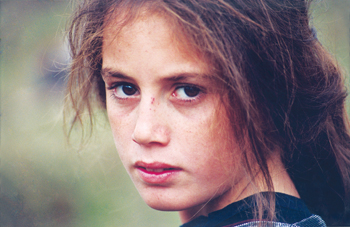![[Metroactive Movies]](/movies/gifs/movies468.gif)
[ Movies Index | Show Times | Silicon Valley | Metroactive Home | Archives ]

Casualty of War: Avaz Latif struggles to survive on the eve of war in Iraq. Shell Shock 'Turtles Can Fly' captures children's dreams of the end of the world in war-torn Iraq RARELY does one see something that really challenges the powers of comprehension. Kurdish director Bahman Ghobadi's Turtles Can Fly is the first fictional feature film to come out of Iraq since the war began. It takes place on the barbed-wired border between Turkey and Kurdistan: Saddam would have called it northern Iraq. The Kurds are gathered, waiting in the days right before the invasion of Iraq by W's army. Refugees squat in tents, near a junkyard of broken tanks and shell casings. The locals make insignificant amounts of money scavenging and stacking the junk in piles. Saddam's army booby-trapped the hillsides with made-in-the-USA mines. Some of the children have a risky part-time job: disarming and harvesting the land mines, bringing them to a nearby bazaar to trade. In the milling crowds, we pick out a few children. Soran, nicknamed "Satellite" (Soran Ebrahim), is about 13, and he is in a privileged position. He is the only one who knows how to hook up a satellite television so the elders of the camp can watch the news. Soran is a fixer, riding around making deals on his colorfully decorated bicycle. He is looking forward to the invasion—not just as a Kurd who hates Saddam but also as a rabid Americanophile. Since Satellite is prosperous, he is also dreaming about getting married. The girl he follows around bears a name that's more Middle-earth than Middle Eastern: she is called Agrin (Avaz Latif). A solemn, lovely wraith haunting the camp, she tends a crossed-eyed toddler who seems to be her little brother. Agrin's elder brother and protector, Pasheo (Saddam Hossein Feysal), is a pugnacious kid, not afraid of a fight. That quality is all the more notable because he has only stumps for arms—he lost his hands in a land mine explosion. In exchange, he gained the gift of prophecy. His dreams foretell the future. Pasheo's forecasts are more accurate than Satellite's jury-rigged CNN coverage, with its "Confronting Terror" banners, its fast edits of gesticulating men in suits making threats in a language no one in the camp can understand. Turtles Can Fly is a kind of postapocalyptic Our Gang comedy, set on a literal blasted heath. In the fog and drizzle, crippled children wander through what's left of their childhoods, untroubled by adult supervision. The cast is nonprofessional, and there is a sense of play and liveliness in the children. Satellite's enthusiasm keeps the film moving. Still, Agrin wants no part of Satellite, even when the boy gives her the present of a gas mask. Agrin's unhappiness is explained in horrifying flashback. By this point, we're already assured that the tattered silk embroidered robes she wears will become her shroud. Before he made A Time for Drunken Horses (2000), director Ghobadi was an Iranian film-school dropout. Turtles Can Fly has that sense of the implicit that makes Persian cinema so deep and challenging. Westerners often credit the power of the unsaid in Iranian movies to the many layers of censorship in that nation. In blaming censors, we must be trying to solve the dilemma of American cinema, which is supposedly allowed to say anything it wants but far more often says nothing at all. Turtles Can Fly is rawer and stranger than any Iranian film I've seen. The Western viewer is an outsider, missing details that must have centuries of meaning behind them. Some symbolism about "red fish" is elusive. I couldn't find anyone who understood Pasheo's enigmatic last prophecy. In the press notes, Ghobadi claims that Kurdistan is so pocked with land mines that "nowadays, there are families who call their newborns 'Mine.'" And what's that supposed to mean? Is this Ghobadi's bleak joke? If this really happens, is the name meant to be a charm against claymores? Or is it an attempt to give a son a name that invokes the power of a land mine, in the same way people might have once named a child Lion or Tiger? Still, most of Turtles Can Fly is brave, shocking and easy to comprehend—or, rather, as easy to comprehend as war ever is. Latif is unforgettable as the young, doomed Agrin. The somber, hallucinatory images stick with you: the flash of a village burning, a girl's arm thrown up into the night sky, the tanks racing past Satellite on a mud road as he at last realizes that he's not going to be swooped up into the USA as if by religious rapture—and Pasheo running down the road, trying to wipe his tears away with his stumps.
Turtles Can Fly (Unrated; 95 min.), directed and written by Bahman Ghobadi, photographed by Shahriar Assadi and starring Avaz Latif and Soran Ebrahim, opens Friday at selected theaters.
Send a letter to the editor about this story to letters@metronews.com. [ Silicon Valley | Metroactive Home | Archives ]
|
From the April 13-19, 2005 issue of Metro, Silicon Valley's Weekly Newspaper.
Copyright © Metro Publishing Inc. Metroactive is affiliated with the Boulevards Network.
For more information about the San Jose/Silicon Valley area, visit sanjose.com.